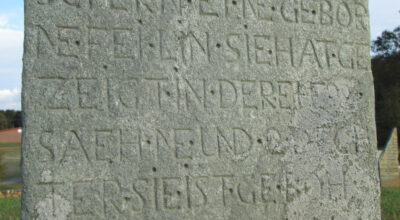My mother’s German ‘friend’
Published 12:00 am Monday, June 2, 2014
Back on Memorial Day, I watched some of those annually rerun, classic war movies. (On June 6, don’t forget to watch “The Longest Day.”) I thought back to a story my mother told me often while I was growing up, and later, after I was grown. Her repetition reinforced its “sticking power” in my mind.
Some years ago, there was a TV movie titled “The Summer of My German Soldier,” about an American girl who falls in love with a World War II German POW incarcerated in a prison camp somewhere in Arkansas.
My mother’s story had to do with World War I, but was very different from that romantically themed TV movie, since she was only 6 years old at the time, 1917.
I’m pretty sure it was 1917. It could have also been 1916, when she was 5, but I’m definitely sure it wasn’t 1918, since I feel sure there was no snow by Nov. 11 of that year, at least any that was “sleddable.”
This happened in Statesville, my mother’s hometown, which I often drove through on my way to and from Appalachian in the early 1970s. I always preferred the more scenic routes, and while driving through downtown Statesville, I recalled family trips to visit Grandmother Mollie Miller Hamlet and Uncle Elgie when they were yet alive.
I particularly remember that one section just outside of the downtown, with its broad avenue (properly named “Broad Street”) and massive shade trees. I can still picture Statesville’s town clock high above. There is even a mental image of the last time I saw that clock’s face, but just now, I don’t recall the time that its hands told.
As my mother’s “oft-told” (but true) tale went: On a snowy winter’s day, she and some of her little friends were out sledding. A man came by and spoke words to the effect, ”Do you mind if I borrow your sled for a minute, because the sight of it reminds me of my home country?”
My mother said she knew right off that the man’s accent was foreign, and I believe her, because in the South, at that time, a foreign accent probably really stood out. (Just think how it is even now, with “Yankees.”)
The children let the man use the sled, so he went down the hill with great enjoyment, afterwards returning the sled and expressing thanks for the chance to exercise his nostalgia for his mother country (actually, in his case, the “fatherland”). I think my mother said he only went down the hill once, but his “job” probably didn’t allow for much extra time for fun.
My mother told me that about a week later in the Statesville newspaper (“The Landmark” then), there was an article, with picture, about a man who had been arrested for spying.
This was my mother’s same, one-time, sledding “friend,” who turned out to be a spy for the Kaiser.
So instead of “The Summer of My German Soldier,” my mother’s story could have been titled “The Winter’s day of My German Spy.” (Using this title at the beginning of the story would have been “letting the cat out of the bag,” so to speak.)
Another German spy of that era was Mata Hari, who was executed by firing squad. I like to think that my mother’s spy didn’t wind up getting shot, but I believe it was the standard procedure back then.
I guess a small Southern city like Statesville was a good place for a German spy to hide out, and Salisbury would have probably been a good place, too.
My brother Joe is a docent for the Old Stone House, and I have heard him tell the public that some spoken German could still be heard on the streets of Salisbury just after the turn of the 20th century.
Additionally, in towns like Granite Quarry, China Grove, Rockwell, Faith, Landis and certain sections of the Old Concord Road, an especially English-proficient German could have blended in with all of the other Germans who had been living in those places for quite some time.
Mack Williams lives in Danville, Va.


